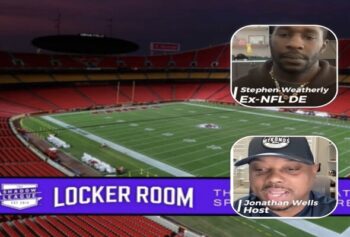As Atlanta hosts it’s third Super Bowl, the magnitude of the event reflects the explosive growth the city has experienced in the past 25 years.
Atlanta has gone through massive changes and an evolution of historic proportions over the last quarter century.
Since the city hosted its first Super Bowl in 1994, emerging Black power brokers in sports, politics, business, media, entertainment and a revitalized downtown, along with the lure of HBCU colleges, has elevated the city to a top destination spot in America.
It’s joined New York and Los Angeles as a haven for black superstars, urban talent and cutting edge culture.
Let’s take a quick look at some ways Atlanta has grown since the first Super Bowl it hosted between the Bills and Cowboys back on Jan. 30, 1994.
Jan. 30 1994 – Super Bowl XXVIII
Cowboys 30, Bills 13
National Anthem: Natalie Cole
Halftime Show: Rockin’ Country Sunday featuring the Judds (Wynonna and Naomi Judd). Clint Black, Travis Tritt and Tanya Tucker.
In a game that featured eight future hall of fame players, MVP Emmitt Smith rushed 30 times for 132 yards and two touchdowns. This Super Bowl was the end of Bills HC Marv Levy’s historic run of four consecutive trips to the Super Bowl without a victory.
Year of OJ
It was also the last time we would see OJ Simpson on television doing a national broadcast. He was NBC’s sideline reporter covering the Bills for the game.
Less than five months later on June 17, 1994, Simpson would usher in the age of reality TV, when the world watched him fleeing in a white Ford Bronco along the freeways of Los Angeles after he was implicated in the murder of his ex-wife Nicole Simpson and her boyfriend Ronald Goldman.
Rise of Rap Gods
In the ’80s, Atlanta’s sound was fused with Miami Bass and that genre of dance music, with roots linked to electro-funk.
The rise of LaFace Records in the ’90s produced soul artists like Toni Braxton and TLC and established ATL as a home base for groundbreaking production and soul music. LaFace also came with Outkast and gritty Southern slangsters like Goodie Mob and the production clique Organized Noize, who introduced the style of hip-hop coined as “Dirty South.”
Jermaine Dupri stepped on the scene with So So Def records, pushing ATL rap into mainstream markets with teen-friendly groups like Xscape, Da Brat and Kris Kross. The myriad artists he brought out infiltrated a firm East Coast hold on urban and hip-hop music.
https://youtu.be/vtgaINvEzdA
Braves Dynasty Popping Off
The Hawks and Falcons have gained some ground on the Braves as baseball overall has lost its popularity among Blacks in the city of Atlanta. However, back in the ’90s, the Braves were a dynasty team and ATL’s most popular sports franchise. The Braves won a record 14 consecutive division championships from 1991 to 2005.
The Black connection with baseball was thicker back then and Atlanta had some of the best brothers in the game in Terry Pendleton, David Justice, Ron Gant, Brian Jordan and even Deion Sanders for a spell.
Centennial Olympic Park bombing
By 1996, Atlanta was expanding and became the third American city and first “Black” city to host the Olympic Games. The city embarked on several major construction projects, revamping parks, sports facilities, and transportation.
The Centennial Olympic Park bombing on July 27 at Centennial Olympic Park, stole some of the luster from an Olympics that produced record success for athletes of color. Team USA women stole the show in gymnastics, track and field, hoops and other disciplines.
The success of the ’96 Olympics led to the explosion of women in athletics that we are witnessing today. Guided and motivated by the spirit of Title IX, the Olympics marked a turning point for the relationship between women and sport in this country.
The WNBA was formed the same year.. The League’s slogan, “We Got Next” explained everything you needed to know about the direction of the city of Atlanta.
Jan. 30, 2000 — Super Bowl XXXIV
St. Louis Rams 23 vs. Tennessee Titans 16
National Anthem: Faith Hill
Halftime show: “The Tapestry of Nations” a Disney -produced joint featuring Phil Collins, Toni Braxton, Christina Aguilera, Enrique Iglesias and Edward James Olmos.
Sean McVay never forgets … and he didn't forget watching the Rams beat the Titans in Super Bowl XXXIV that he attended for his 14th birthday. pic.twitter.com/1a48G7PSwf
— ESPN (@espn) January 22, 2019
MVP Kurt Warner battled Steve “Air” McNair (RIP) and passed for a record 414 yards.
Age of Internet
This also was the dot.com Super Bowl, with several internet companies advertised during the game for the first time.
Ray Lewis And The Death of Buckhead
According to ajc.com, this Super Bowl forever changed the direction of the city and the Buckhead community.
“… a deadly knife fight, a fracas that left a bloody trail from a Buckhead street to inside Ray Lewis’ limousine and to his suite at the Georgian Terrace. Inside his room, Lewis —- then a rising star for the Baltimore Ravens —- put his head in his hands as he realized he would be linked to the deaths of two young men. The slayings pushed city leaders to tame Buckhead’s wild party scene, remaking Atlanta’s nightlife.
In fact, the events of that night are often cited as the beginning of the end of Buckhead as a thriving, raucous nightclub destination where loudspeakers thumped in cruising cars until pre-dawn hours.”
The New ATL
Thus the beginning of a move towards gentrification, as the authenticity of the Atlanta’s African-American local scene began to change in the 2000’s. As industry boomed, locals became less involved in the expansion and changes that were taking place, particularly involving real estate, private business and home ownership.
The exception was music and entertainment.
Falcons owner Arthur Blank has been a driving force behind Atlanta’s economic explosion.
“When I moved here in 1979 and put up the first Home Depot there were less than 1 million people living in the city, now there’s about 7 million people living in the cities.,” Blank said in a Super Bowl week interview with radio host Mike Francesa.
“It’s grown tremendously In the 19 years since the Super Bowl was here in 2000 when the Rams and Titans played here..all of the magnificent venues downtown — not only our stadium which I think is iconic and unique I think one of the best sports and entertainment complexes throughout all of the world.”
By 2009, The New York Times was calling Atlanta “hip-hop’s center of gravity
Record producer Lil Jon hit the scene with his upbeat, crazy, relentlessly loud songs that tore down the clubs. His magical touch and signature “OKayyyyy” became a driving force behind the hip hop sub-genre known as crunk.
From there, hip-hop artists from Atlanta exploded and starting flooding the industry with their Southern sound. From Young Jeezy to T.I. to Ludacris, the list goes on.
Atlanta has also established itself as major influences on other forms of media and Black culture including comedy and acting, with Donald Glover AKA Childish Gambino breaking through commercially and gaining critical acclaim with his cable series “Atlanta”
The Real Housewives of Atlanta franchise transformed Black television and helped usher in a million spin-off series’, making reality shows about women an unstoppable, money-making machine.
Feb. 3, 2019 — Super Bowl LIII
National Anthem: Gladys Knight
Halftime Show: Maroon 5, Travis Scott, Big Boi
MVP Prediction: Todd Gurley
Score Prediction: Rams 33, Pats 30
It’s 2019 and Atlanta is at the top of the Black, urban entertainment game. From the finest strip clubs to the most well-connected corporate movers, shakers and sports and entertainment moguls to the emergence of Trap music which has been the leading and most lucrative genre of hip-hop on the Billboard charts.
“Honestly, from the music scene to the various entertainment venues, the Super Bowl couldn’t be in a better city right now,” Blank said. “You got the largest aquarium in the country today. You got the national civil human rights museum . The world of Coke, Children’s Museum, College Hall of Fame all within a short walking distance, which is part of the beauty as well of doing a Super Bowl here.”



